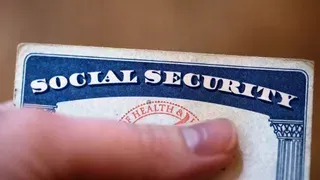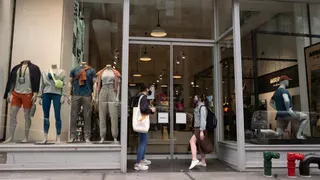July 20, 2012
Two Colo.Incidents Highlight How Faked Hate Crimes Hinder LGBT Efforts
Winnie McCroy READ TIME: 7 MIN.
As the LGBT community secures our rights, the inevitable backlash of anti-gay hate crimes has predictably followed. But also on the rise is a threat far more sinister to the LGBT community: reports of fake anti-bias crimes, which threaten to discredit the many real incidents that put our community at risk, and place doubt in the minds of both law enforcement and our conservative rivals.
On June 21, Parker, Colorado residents Christel Conklin and Aimee Whitchurch entered guilty pleas for faking a hate crime that they reported on October 28, 2011.
Conklin, 29, and Whitchurch, 37, reported that they woke to find "Kill the gay" written in red spray paint on their garage door; the following day, they found a noose hanging from their front door handle, the women said.
Through the investigation and witness statements, detectives at the Douglas County Sheriff's Office, working with the FBI, soon determined that the two women were responsible for the acts. Forensics evidence reportedly found traces of the spray paint on the women's hands; the two refused to take a lie detector test.
"Through the investigation and from witness statements, it was determined that allegations of the incident were false. Detectives were able to determine that the two women involved were responsible for the words that were spray painted on the garage and the placement of the noose on their own front door," Douglas County Sheriff's Office spokeswoman Cocha Hedyen told a local TV news station.
Hedyn said that Whitchurch faced two counts of criminal mischief, one count of forgery and one count of false reporting. Conklin faced two counts of criminal mischief and two counts of false reporting.
At the time, Whitchurch told ABC's Denver affiliate KMGH-TV that she vowed to fight the charges, saying, "This is a fight I started. This is a fight I'm going to finish. This is a fight I'm right on. I have every right to live where I want to live."
But the women received 12 months of supervised probation and 24 hours of community service.
Similar Faux Hate Crime Rocks Connecticut
Details of the case are very similar to another incident of false hate crime reporting that occurred in New Britain, Connecticut. Alexandra Pennell, a 19-year-old student at Central Connecticut State University, was arrested on May 2 after pleading guilty to falsely reporting a hate crime, fabricating evidence and making a false statement.
After she reported receiving harassing, anti-gay notes slipped under her door or written on the dry-erase board on her door, Pennell received an outpouring of support from the community, hundreds of who rallied in her support on the New Britain campus last March.
"All I have to say is that I'm not going to be run out of my home, and I will not be intimidated by hate," Pennell said at the rally.
But when CCSU police set up a video camera to identify the culprit, footage revealed Pennell putting a note under her door, then retrieving it and calling the police to report the incident.
After initially insisting that some of the notes had been real, she eventually admitted that she staged all of the incidents, saying that she was looking for attention from her roommate, Siobhan Dooley, and hoped that the woman would spend more time with her.
Pennell was suspended from attending any Connecticut state university school for five years, and is due back in court on July 26 to answer to eight felony counts of fabricating evidence, eight misdemeanor charges of lying to police, eight misdemeanor counts of filing a false police report and one count of making a false statement to police.
University officials were chagrined by the news, but stood by their response.
"We remain proud of the campus community's response to what we believed was an act of bias, and we reaffirm now what was said then: Acts of bias and hate will not be tolerated at CCSU, said university spokesman Mark McLaughlin.
A month earlier in North Carolina, a UNC-Chapel Hill freshman told police he was attacked and burned by a man who called him an anti-gay slur.
On April 5, Freshman Quinn Matney told the police he was outside his South Campus dorm on April 4 when another college-aged man approached him, called him an anti-gay epithet and pressed a hot piece of metal to his left wrist that left an imprint of a figure 8.
"As a university community, we condemn this act of violence," wrote Chancellor Holden Thorp. "Our Department of Public Safety will bring the strongest possible charges against the attacker."
A week later, the chancellor reported that the Department of Public Safety determined that the alleged aggravated assault reported to campus did not occur, and that the university would not report it as a hate crime.
"It is important to recognize that incidents of harassment do occur," said Thorp. "When they do, we take them seriously. We strive to foster a welcoming, inclusive and safe environment at Carolina."
Other Fake Bias Crimes Reported, But Gay Hate Crimes Resonate
One only need look back at the now infamous Tawana Brawley case to see that reporting fake bias crimes is nothing new. In 1987, the 15-year-old African-American woman falsely accused six white men, some of whom were police officers, of raping her.
After being missing for four days from her Wappingers Falls, New York home, she was found seemingly unconscious in a garbage bag, smeared with feces, with the words "KKK," "Nigger," and "Bitch" written on her torso in black charcoal.
The case captured headlines across the nation, with Rev. Al Sharpton leading the publicity. A 1988 grand jury concluded that Brawley had not been attacked; her schoolmates testified she had attended a local party during the time of her supposed abduction, and one witness claimed to have seen her climbing into the garbage bag. Many later speculated that Brawley fabricated the hoax to avoid punishment from her stepfather, Ralph King, who was known for dispensing violent punishments.
Although it is hard to believe that anyone would attempt a similar hoax, this April, a black foreign exchange student from Germany said she was attacked in a Colorado Park in what later turned out to be a false report.
The 15-year-old, a junior at Berthoud High School, said she was walking home on April 12 when she was accosted by a group of white men, who she said used intimidating and racially-charged language, and cut her face with a knife. The police did confirm reported knife cuts to her forehead.
The Berthoud Police Department teamed up with the FBI and the Anti-Defamation League to mount an investigation, but after multiple interviews, the girl admitted that the incident did not happen in Berthoud, but overseas.
Chief Glenn Johnson said they would not press charges, believing that the girl was revealing details of an alleged assault she suffered three years ago in Germany.
"We're not intending on prosecuting her," said Johnson. "With violent crimes, it sometimes takes time for information to come out."
And in Denver in August 2009, the windows of a Democrat Party headquarters were smashed in an apparent partisan bias crime. State Democratic Party Chairwoman Pat Waak immediately blamed conservatives for the attack, but police soon apprehended the real perpetrator, Maurice Schwenkler, a long-term Democratic activist who was a paid worker for various liberal organizations in Colorado.
When minority groups perpetrate phony hate crimes, it immediately calls into doubt all of the real bias incidents reported by these groups. But in the case of the LGBT community, the great strides that we have made are still recent enough to be held suspect by the larger, mainstream community.
Those who feel that heavy penalties for anti-gay bias crimes are unwarranted get fuel for their fire when reported cases are later revealed to be hoaxes. And the countless victims of real incidents of bias crimes are less willing to come forward and report these incidents to the authorities when those seeds of doubt have been sown.
In many of the cases, we can blame the relative youth of the perpetrators for their foolish actions. But when adults in the LGBT community stage phony hate crimes as part of some vendetta against neighbors, or as a plea for attention, it serves only to drag the entire community down.
Winnie McCroy is the Women on the EDGE Editor, HIV/Health Editor, and Assistant Entertainment Editor for EDGE Media Network, handling all women's news, HIV health stories and theater reviews throughout the U.S. She has contributed to other publications, including The Village Voice, Gay City News, Chelsea Now and The Advocate, and lives in Brooklyn, New York.





